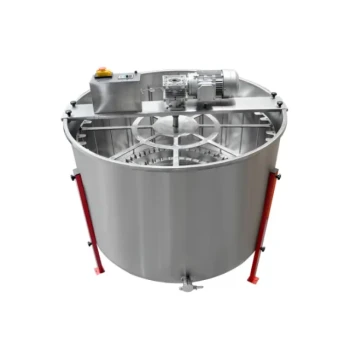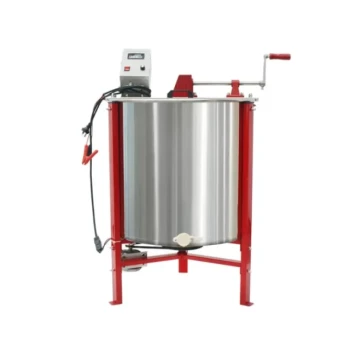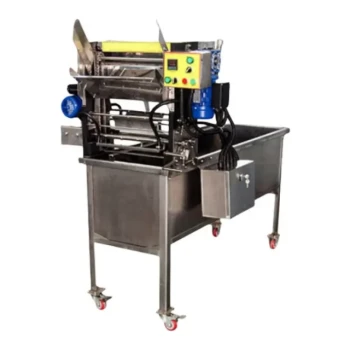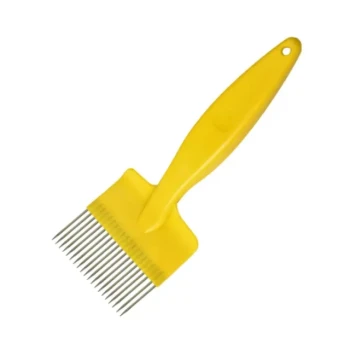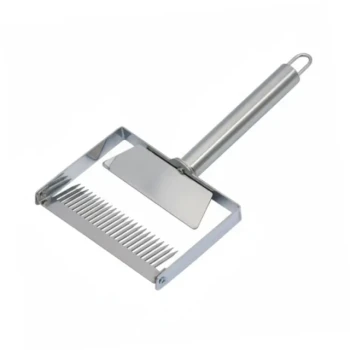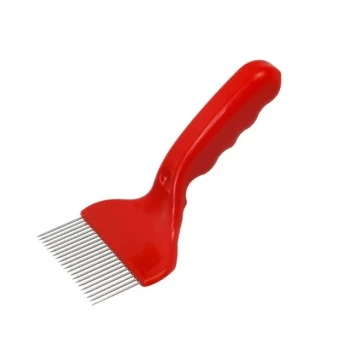At its core, a honey spinner is a machine that extracts honey from the honeycomb. Known formally as a honey extractor, it uses centrifugal force to sling the honey out of the wax cells without destroying the comb. The device consists of a drum containing a basket that holds the honey frames, and when this basket spins, the honey is flung out and collects at the bottom.
The fundamental purpose of a honey spinner is to separate honey from the comb efficiently while preserving the comb's structure. This allows beekeepers to return the intact frames to the hive, saving the bees immense energy they would otherwise spend rebuilding the wax.
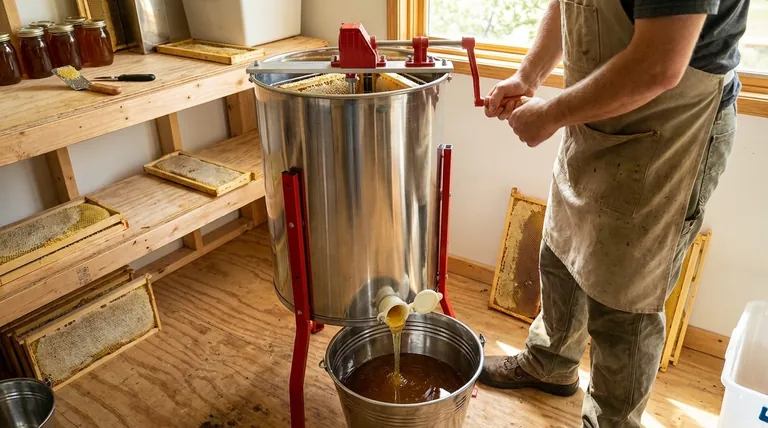
How a Honey Spinner Works
A honey spinner is a simple yet highly effective mechanical device. Understanding its operation reveals why it is the standard for modern honey harvesting.
The Principle of Centrifugal Force
The extractor works by spinning frames of honeycomb at a high speed. Just as a spinning merry-go-round pushes you outward, the rotational force flings the dense, heavy honey out of the wax cells.
The lighter wax comb remains safely in the frame basket, undamaged by the process.
The Critical Benefit: Preserving the Wax Comb
The single greatest advantage of using a spinner is the preservation of the drawn-out wax comb. Bees expend a significant amount of energy and resources to produce wax and build these intricate structures.
By returning the empty but intact combs to the hive, the bees can immediately begin refilling them with honey instead of starting from scratch. This dramatically increases the hive's potential for honey production in a season.
The Next Step: Filtering
Honey coming directly from the spinner will contain small particles of wax and other hive debris.
Therefore, the extracted honey is typically poured through a fine mesh screen or layers of cheesecloth. This filtering step ensures the final product is clear, pure, and ready for bottling.
Understanding the Trade-offs
While a spinner is the most common tool, it's important to understand it in the context of other methods. The primary alternative is the "crush and strain" method.
The Spinner (Extractor) Method
This method prioritizes efficiency and hive health. It yields a high volume of clean honey and, most importantly, preserves the valuable wax comb. The main investment is the extractor itself, which can range from small, hand-cranked models to large, motorized units.
The Crush and Strain Method
This low-tech approach involves mashing up the entire honeycomb and letting the honey drip out through a sieve or filter cloth. It requires no special equipment beyond a bucket and a filter.
The significant downside is the complete destruction of the comb. The bees must rebuild it entirely, and the harvested wax must be rendered and processed separately if you wish to use it.
The Spinner's Role in the Broader Harvesting Process
A honey spinner is just one tool in a series of steps required to get honey from the hive into a jar.
Step 1: Uncapping the Comb
Before placing frames in the spinner, the beekeeper must remove the thin wax layer, or "cappings," that the bees build to seal the honey in each cell. This is typically done with a special hot knife or a sharp, serrated uncapping tool.
Step 2: Spinning the Honey
With the cells uncapped, the frames are loaded into the extractor. The spinning process begins, slinging the honey out where it can be collected from a spout at the bottom of the drum.
Step 3: Verifying Quality with a Refractometer
For honey to be stable and not ferment in storage, its moisture content must be below approximately 18%. A honey refractometer is a specialized optical instrument used to get a precise measurement of this moisture content. It works by measuring how much light bends as it passes through a tiny honey sample.
Step 4: Bottling the Honey
The final step is bottling. For larger operations, a honey filling machine ensures each jar is filled with a precise, consistent volume. These machines are designed with food-grade materials to maintain hygiene and significantly speed up the packaging process.
Making the Right Choice for Your Goal
Selecting the right harvesting method and tools depends entirely on the scale of your operation and your primary objectives.
- If your primary focus is long-term hive productivity and efficiency: A honey spinner is the essential choice because it preserves the comb.
- If you are a hobbyist with only one or two hives: The crush and strain method is a viable, low-cost starting point, but be aware that it creates more work for your bees.
- If you plan to sell your honey or store it for long periods: Investing in a refractometer is crucial for ensuring you are bottling a high-quality, stable product that meets customer expectations.
Ultimately, understanding how a honey spinner functions within the larger process empowers you to harvest honey in a way that is both effective for you and beneficial for your bees.
Summary Table:
| Feature | Honey Spinner (Extractor) | Crush & Strain Method |
|---|---|---|
| Primary Goal | Efficiency & Hive Health | Simplicity & Low Initial Cost |
| Comb Preservation | Yes, frames are reused | No, comb is destroyed |
| Impact on Bees | Low; bees refill existing comb | High; bees must rebuild comb |
| Ideal For | All beekeepers focused on productivity | Hobbyists with 1-2 hives |
Ready to Harvest Honey More Efficiently?
HONESTBEE supplies commercial apiaries and beekeeping equipment distributors with the robust, high-capacity honey spinners and harvesting equipment they need to succeed. By preserving wax comb, our extractors help you maximize honey yields season after season while supporting the long-term health of your hives.
Let's discuss your operation's needs. Contact our wholesale experts today to find the perfect extraction solution for your business.
Visual Guide
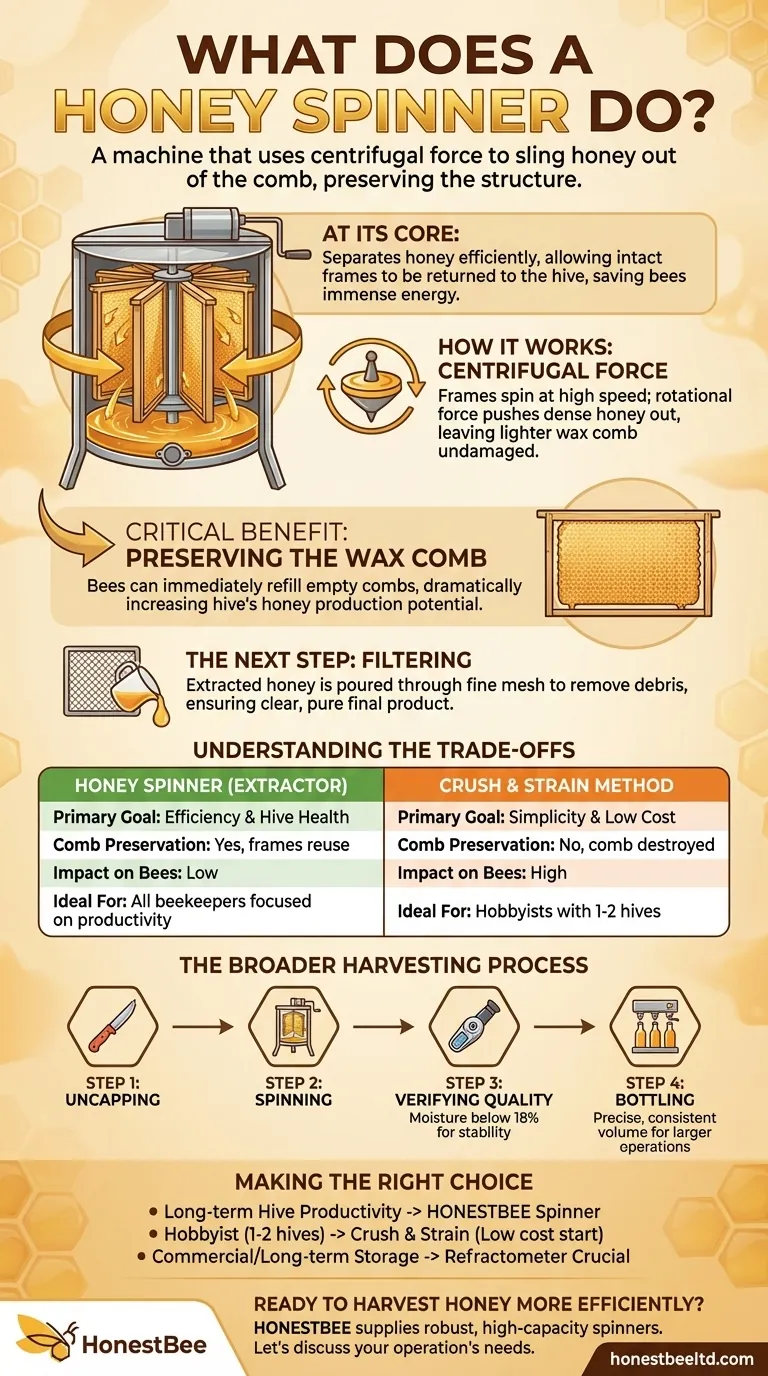
Related Products
- 2 Frame Stainless Steel Manual Honey Spinner Extractor for Beekeeping
- 6 Frame Manual Stainless Steel Honey Extractor Beekeeping Equipment
- HONESTBEE 72 Frame Industrial Electric Honey Extractor for Beekeeping
- electric honey extractor honey centrifuge 3 frame honey extractor stainless steel honey frame extractor
- Plastic Hand Crank 2 Frame Honey Extractor Low Price
People Also Ask
- How long does it take to extract honey with a manual extractor? A Guide for Hobbyist Beekeepers
- What equipment do you need to process honey? A Complete Guide for Every Scale of Operation
- What is a tangential extractor and how does it work? A Complete Guide for Hobbyist Beekeepers
- How should one choose between manual and automatic honey extractors based on production volume? Maximize Your Apiary's Efficiency
- How can a pressure washer be used to clean a honey extractor? A Guide to Safe and Efficient Cleaning






